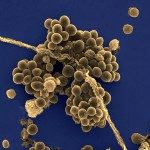Link to Pubmed [PMID] – 27414497
Cell Host Microbe 2016 Jul;20(1):49-59
Induction of type I interferon (IFN) in response to microbial pathogens depends on a conserved cGAS-STING signaling pathway. The presence of DNA in the cytoplasm activates cGAS, while STING is activated by cyclic dinucleotides (cdNs) produced by cGAS or from bacterial origins. Here, we show that Group B Streptococcus (GBS) induces IFN-β production almost exclusively through cGAS-STING-dependent recognition of bacterial DNA. However, we find that GBS expresses an ectonucleotidase, CdnP, which hydrolyzes extracellular bacterial cyclic-di-AMP. Inactivation of CdnP leads to c-di-AMP accumulation outside the bacteria and increased IFN-β production. Higher IFN-β levels in vivo increase GBS killing by the host. The IFN-β overproduction observed in the absence of CdnP is due to the cumulative effect of DNA sensing by cGAS and STING-dependent sensing of c-di-AMP. These findings describe the importance of a bacterial c-di-AMP ectonucleotidase and suggest a direct bacterial mechanism that dampens activation of the cGAS-STING axis.




